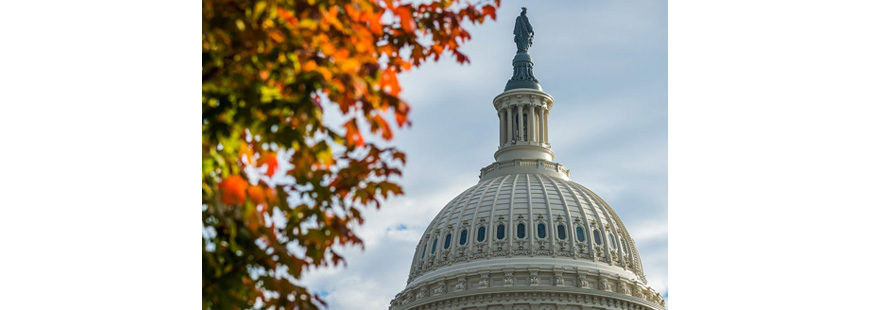What a year it’s been so far. While infrastructure and reconciliation remain a focus of Capitol Hill and nearly all of D.C., there has been action on several other Network priorities this past year.
In January, a stunned nation and world watched a mob swarm the Capitol building, former President Trump was a impeached a second time, setting an acrimonious tone for the 117th Congress as they began their work. Control shifted to the Democrats as they took control of both chambers of Congress, albeit with razor-thin margins.
What a start.
It was then down to work. At the end of January, President Biden signed the Executive Order on Tackling the Climate Crisis at Home and Abroad. Notable in that EO was Section 216, specifying the steps the administration will take to, “achieve the goal of conserving at least 30 percent of our lands and waters by 2030.” That process is well underway, and the Network formed a special workgroup to provide recommendations to the administration. You can read the specifics of this EO here and its associated fact sheet here.
In March, Congress passed a $1.9 trillion covid relief package, which President Biden promptly signed into law. That package included $4 billion for USDA to, “purchase and distribute agricultural commodities,” which includes seafood, an improvement to the legislation that the Network had championed.
Chair and Ranking Member of the Senate Commerce Committee, Sens. Cantwell (D-WA) and Wicker (R-MS), reintroduce the Fishery Resource Disaster Improvement Act, that month. The bill reforms NOAA’s Fisheries Disaster Relief program by assigning a 120-day timeline for the Secretary to evaluate a fisheries disaster request, among other things.
And toward the end of April, the Senate Commerce Committee held a hearing on several bills, including a few oceans and fisheries-related bills, such as Sen. Wicker’s National Ocean Exploration Act (S.381) and FLOODS Act (S.558). But it was May when we saw the first major legislative action on fisheries and oceans work.
First, Reps. Jared Huffman (D-CA) and Garrett Graves (R-LA) introducing the Illegal Fishing and Forced Labor Prevention Act, to combat illegal, unregulated and unreported (IUU) fishing and human rights abuses in the seafood supply chain. You can read Huffman’s bill text, one-pager, section by section synopsis and press release here.
In the Senate, the Committee on Commerce, Science and Transportation considered the BLUE GLOBE Act (S.140), a bill by Sens. Whitehouse (D-RI) and Murkowski (R-AK) addressing data collection, monitoring and management of data collected in oceans, bays, estuaries and the Great Lakes.
The Senate committee took up other marine policy legislation:
- The American Fisheries Advisory Committee Act (S.497), a bill by Sens. Sullivan (R-AK) and Cantwell (D-WA) that directs NOAA to establish an American Fisheries Advisory Committee.
- The Shark Fin Sales Elimination Act (S.1106), a bill by Sens. Booker (D-NJ) and Capito (R-WV) that does what the title implies.
- And S.1289, a bill by Chairwoman Cantwell (D-WA) that reauthorizes the John H. Prescott Marine Mammal Rescue Assistance Grant Program.
You can find information on these bills and the committee’s hearing here.
The U.S. Department of Agriculture (USDA) announced it planned to purchase up to $159.4 million in domestically produced seafood, fruits, legumes and nuts for various food assistance programs. You can read more about this important move by USDA here.
In May, Chellie Pingree (D-ME) introduced, the Keep America’s Waterfronts Working Act, with cosponsor Rep. Rob Wittman (R-VA). You can read her press release here, along with the Network’s statement here. The Network has been long-supportive of this bill because it is a great “dry side” complement to our own working waterfronts policy position. The two taken together could do a lot of good for coastal communities and local seafood businesses.
NOAA released its annual Status of Stocks Report for 2020 and its latest edition of fisheries statistics. You can catch up on NOAA’s announcement of these two reports here, the full Status of Stocks 2020 report here, and the Fisheries of the United States 2019 report here. And we saw Dr. Richard Spinrad of Oregon State University get nominated to be the Under Secretary of Commerce for Oceans and Atmosphere, and he was sworn in as the new NOAA administrator in June.
June began with the White House proclaiming June as National Ocean Month. The proclamation recognizes the ocean as critical to our economy and to a sustainable food source, addressing its ability to mitigate climate change and provide several other benefits. You can read the details here.
Rhode Island’s Janet Coit was nominated as the Assistant Secretary for Oceans and Atmosphere and Deputy Administrator (Acting) at NOAA later in June as well. Coit is an old friend of the Network, and we are delighted to see her in this new role.
House Natural Resources Committee Chairman Rep. Raúl Grijalva (D-AZ) introduced a new Oceans-Based Climate Solutions Act, on World Oceans Day (June 8) no less. The bill, an updated version of last year’s bill of the same name, seeks to modernize federal ocean policy to account for climate change. You can read the committee’s press release here, you’ll find a copy of the bill text here, a section-by-section analysis here, and a description of the differences between last year’s bill and this year’s bill here.
All of this action brought us into the annual August recess, which then led into infrastructure and reconciliation plans dominating Washington ever since. Nonetheless, we expect some more fish and oceans action later this month once Congress catches its breath and begins to shift its focus to more traditional legislating. We’re on top of it, as always, and will keep all of you abreast of the action as it happens.


